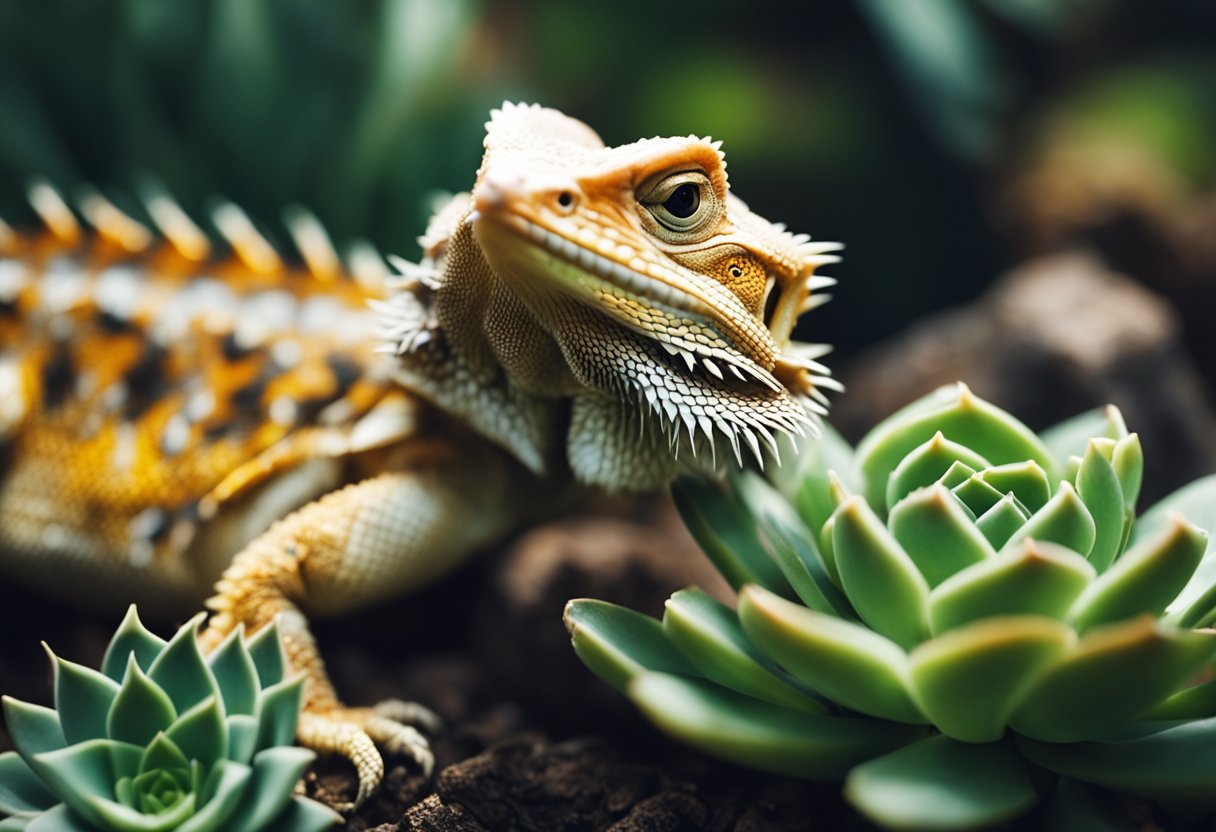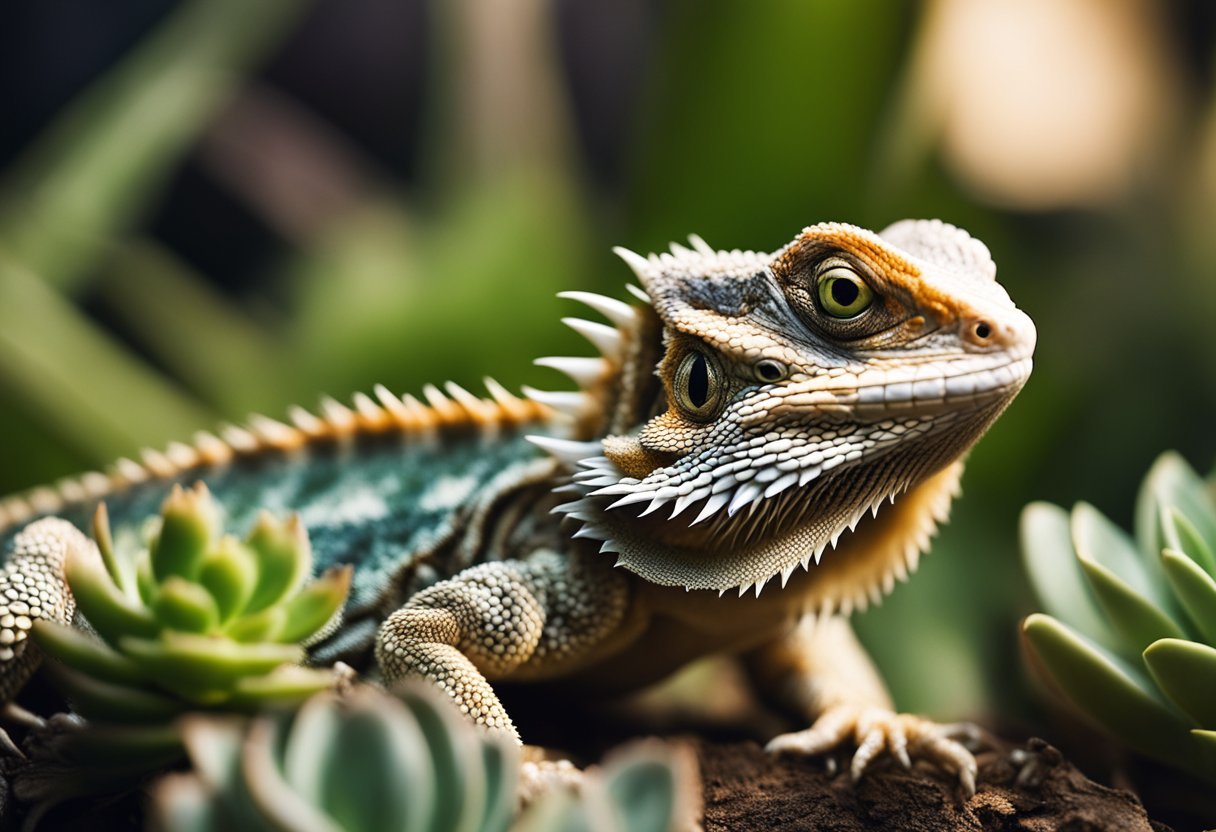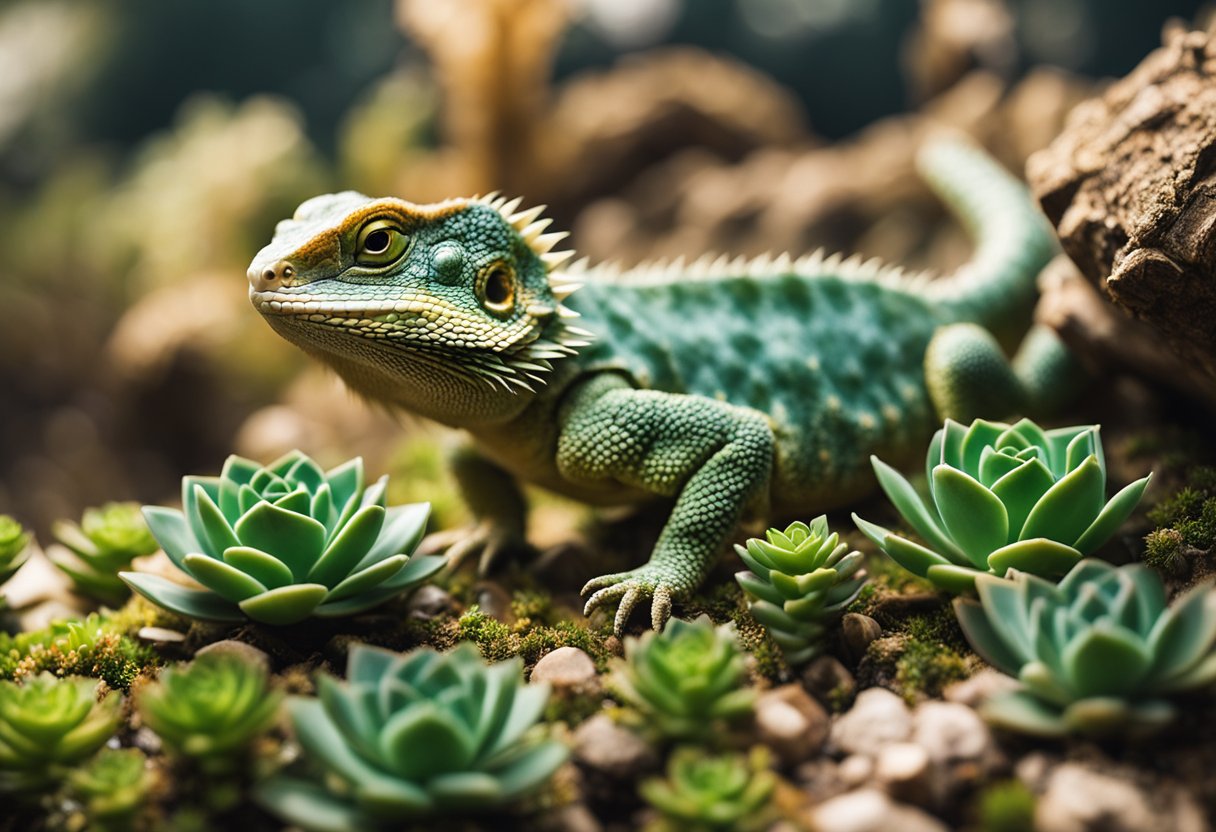Can Bearded Dragons Eat Succulents? A Guide to Safe and Healthy Feeding
Bearded dragons are fascinating creatures, and as a pet owner, it is essential to ensure that they receive a well-balanced diet. While insects and vegetables are a staple in their diet, you may wonder if succulents can be included in their meals. Succulents are a popular choice for indoor plants, and it is natural to question whether they are safe for your bearded dragon to eat.
This post may contain affiliate links, which means I’ll receive a commission if you purchase through my link, at no extra cost to you. Please read full disclosure here.

The good news is that many succulents are safe for bearded dragons to consume. These plants are rich in fiber, vitamins, and minerals, which can be beneficial for your pet’s health. However, it is crucial to note that not all succulents are safe for bearded dragons, and some can be toxic. Therefore, it is essential to research and understand which succulents are safe and which ones to avoid.
Understanding Bearded Dragons’ Diet

Bearded dragons are omnivores, which means they eat both plants and animals. Their diet should be balanced and include a variety of foods to provide essential nutrients. A balanced diet for bearded dragons should consist of approximately 20% insects, 80% vegetables and fruits, and a small amount of fiber.
Insects are an important part of a bearded dragon’s diet as they provide protein. Some examples of insects that can be fed to bearded dragons include crickets, mealworms, and waxworms. It is important to feed insects that are gut-loaded, which means they have been fed a nutritious diet before being fed to the bearded dragon.
Vegetables and fruits are also important for bearded dragons as they provide essential nutrients. Safe vegetables for bearded dragons include collard greens, mustard greens, turnip greens, and kale. Fruits should be fed in moderation and can include strawberries, blueberries, and raspberries.
Succulents can be part of a bearded dragon’s diet, but other nutritious greens and insects must be balanced. Succulents should not replace the main components of their diet. Each bearded dragon is unique, and some individuals may have sensitivities or allergies to specific succulents. It is important to observe the bearded dragon’s behavior and health when introducing new foods.
Bearded dragons have specific dietary needs that must be met to ensure their health and well-being. A balanced diet that includes a variety of natural foods that are easy to digest and provide essential nutrients is essential for their health.
Safe and Toxic Succulents for Bearded Dragons

Bearded dragons are omnivores and can eat a variety of fruits, vegetables, and insects. However, not all plants are safe for them. Some succulents can be toxic and cause harm to your pet. Therefore, it is important to know which succulents are safe for bearded dragons and which ones to avoid.
Safe Succulents for Bearded Dragons
Some safe succulents for bearded dragons include:
- Echeveria: This succulent is safe for bearded dragons and can be a great addition to their diet. It is rich in nutrients and can help supplement their diet.
- Haworthia: Another safe succulent for bearded dragons, Haworthia is non-toxic and can provide a variety of nutrients.
- Jade Plant: This succulent is safe for bearded dragons in small amounts. It is low in oxalates and can be a good source of hydration.
- Aloe Vera: Aloe vera is safe for bearded dragons and can provide a variety of health benefits. It can help with digestion and boost the immune system.
- Hens and Chicks: This succulent is safe for bearded dragons and can provide a variety of nutrients. It is low in oxalates and can be a good source of hydration.
- X Pachyveria: This succulent is safe for bearded dragons and can provide a variety of nutrients. It is low in oxalates and can be a good source of hydration.
- Sempervivum: Another safe succulent for bearded dragons, Sempervivum is low in oxalates and can be a good source of hydration.
- Prickly Pear Cactus: This succulent is safe for bearded dragons and can provide a variety of nutrients. It is low in oxalates and can be a good source of hydration.
- Sedum: Sedum is safe for bearded dragons and can provide a variety of nutrients. It is low in oxalates and can be a good source of hydration.
- Opuntia: This succulent is safe for bearded dragons and can provide a variety of nutrients. It is low in oxalates and can be a good source of hydration.
- Aeonium: Aeonium is safe for bearded dragons and can be a great addition to their diet. It is rich in nutrients and can help supplement their diet.
- Schlumbergera: Another safe succulent for bearded dragons, Schlumbergera is non-toxic and can provide a variety of nutrients.
- Lithops: This succulent is safe for bearded dragons and can provide a variety of nutrients. It is low in oxalates and can be a good source of hydration.
- Stonecrop: Stonecrop is safe for bearded dragons and can provide a variety of nutrients. It is low in oxalates and can be a good source of hydration.
- Agave: Agave is safe for bearded dragons and can provide a variety of nutrients. It is low in oxalates and can be a good source of hydration.
Toxic Succulents for Bearded Dragons
Some toxic succulents for bearded dragons include:
- Acocanthera
- Amaryllis
- Bittersweet
- Periwinkle
- Peyote
- Poison Ivy
- Poison oak
- Poison poppy
- Primrose
- Privet
- Rhododendron
- Rosary pea
- Shamrock
- Sorrel
These succulents can be harmful to your pet and should be avoided. They can cause skin irritation, digestive problems, and even death in severe cases.
In conclusion, it is important to know which succulents are safe for bearded dragons and which ones to avoid. Always do your research before introducing a new plant to your pet’s diet.
Possible Health Implications
While some succulents can be safe for bearded dragons to consume, there are also potential health implications that should be considered.
One of the most common issues that can arise from feeding succulents to bearded dragons is diarrhea. Some succulents contain high levels of oxalates, which can cause digestive upset and diarrhea in bearded dragons. It is important to research the specific succulent before feeding it to a bearded dragon to ensure that it does not contain high levels of oxalates.
In addition to digestive issues, some bearded dragons may have adverse reactions to certain succulents. Symptoms of an adverse reaction can include lethargy, loss of appetite, and even death. If a bearded dragon exhibits any of these symptoms after consuming a succulent, it should be taken to a veterinarian immediately.
Another potential concern is the presence of oxalic acid in some succulents. Oxalic acid can bind to calcium, preventing it from being absorbed by the body. This can lead to calcium deficiencies, which can have serious health implications for bearded dragons. While some succulents are high in calcium and can be beneficial for bearded dragons, it is important to ensure that the succulent does not contain high levels of oxalic acid.
Overall, while some succulents can be safe and even beneficial for bearded dragons, it is important to research the specific succulent and consider any potential health implications before feeding it to a bearded dragon. It is also important to ensure that bearded dragons are properly hydrated and receiving a balanced diet that includes a variety of foods to support their digestion and overall health.
Creating a Safe Environment in the Enclosure
When it comes to creating a safe environment in the bearded dragon’s enclosure, it is important to consider the type of plants that are being used. Live plants can provide a natural and visually appealing environment for the bearded dragon, but it is important to ensure that they are non-toxic and safe for the pet.
Terrariums or tanks can be filled with both live and fake plants. If live plants are used, it is important to research which plants are safe for bearded dragons. Some safe plants include aloe vera, banana leaves, bromeliads, eucalyptus, ferns, mint, basil, oregano, rosemary, hibiscus, kale, and lettuce. These plants can provide vitamins and minerals to the bearded dragon’s diet, while also providing natural food and enrichment.
It is important to note that not all succulents are safe for bearded dragons. While some succulents are non-toxic, others can be toxic and harmful to the pet. Some safe succulents for bearded dragons include the burro’s tail and echeveria. It is important to research the specific succulent before introducing it into the bearded dragon’s enclosure.
In addition to researching safe plants, it is important to maintain a safe environment in the bearded dragon’s enclosure. This includes regularly cleaning the enclosure and ensuring that there are no sharp or dangerous objects that could harm the pet.
Overall, creating a safe environment in the bearded dragon’s enclosure involves researching safe plants and maintaining a clean and hazard-free environment.
Considerations for Outdoor Gardens
If you plan to grow succulents for your bearded dragon in an outdoor garden, there are a few things to keep in mind. First, be sure to choose plants that are safe for your pet to consume. Avoid using pesticides or other chemicals on your plants, as these can be harmful to your bearded dragon if ingested.
When propagating succulents for your outdoor garden, be sure to use sterile soil and clean tools to prevent the spread of disease. Additionally, keep in mind that some succulents may be hybrids and may not have the same nutritional value as their non-hybrid counterparts.
While fresh flowers can be a beautiful addition to your outdoor garden, be sure to avoid planting any flowers that are toxic to your pet. Daylilies and carnations, for example, should be avoided as they can be harmful if ingested.
Overall, with a little bit of research and careful planning, an outdoor garden can be a great source of safe and nutritious succulents for your bearded dragon.
Precautions and Further Research
While it is generally safe for bearded dragons to consume succulents, there are some precautions that should be taken. As with any new food, it is important to introduce succulents slowly and in small amounts to monitor for any adverse reactions. Additionally, bearded dragons should not be fed succulents that have been treated with harmful chemicals or fertilizers, as these can be toxic to them.
It is also important to note that not all succulents are safe for bearded dragons to consume. Some succulents contain harmful chemicals or are toxic to reptiles, so it is important to do thorough research before introducing any new plant to their diet. The Jade Plant, for example, is safe for bearded dragons to consume, but the Aloe Vera plant is toxic and should be avoided.
Further research is needed to determine the long-term effects of feeding succulents to bearded dragons. While they can provide essential nutrients and fiber, it is important to ensure that they are not causing any digestive issues or other health problems. As with any aspect of caring for a bearded dragon, it is important to consult with a veterinarian or reptile expert if there are any concerns or questions.
In summary, while succulents can be a safe and nutritious addition to a bearded dragon’s diet, it is important to take precautions, avoid toxic plants, and do further research to ensure their safety and well-being.